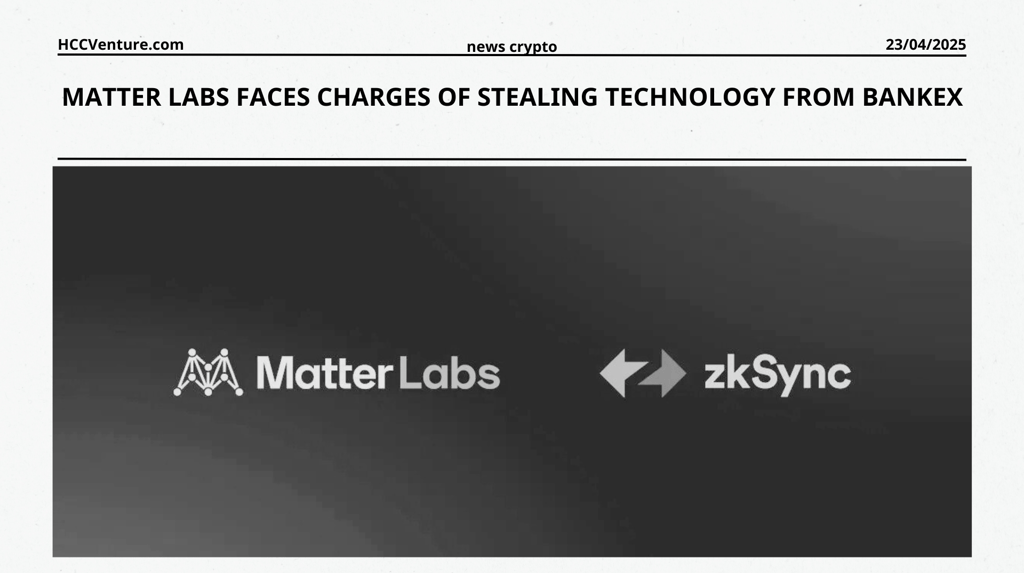Matter Labs faces charges of stealing technology from BANKEX
Matter Labs, the company behind the zkSync blockchain project, has recently been embroiled in a major legal battle after being accused of intellectual property theft by BANKEX. The case, which was brought before the New York Supreme Court, has sparked controversy in the cryptocurrency community and raised questions about transparency and ethics in the blockchain industry.
4/23/20252 min read


Background of the case
Matter Labs is one of the prominent names in the field of Layer-2 scaling solutions for Ethereum, with its flagship product being zkSync – a protocol that uses zk-Rollups technology to increase transaction speeds and reduce costs. zkSync has attracted a lot of attention due to its potential to improve Ethereum’s scalability, especially amid the growing demand for DeFi and NFT solutions. However, Matter Labs’ rapid growth appears to have hit a regulatory hurdle.
BANKEX, a company specializing in blockchain technology and digital assets, filed a lawsuit against Matter Labs on March 19 in New York. According to the lawsuit, two former BANKEX employees used the company's proprietary technology to develop the platform for Matter Labs, which resulted in zkSync. BANKEX claims that this behavior violates intellectual property rights and causes serious damage to them. The lawsuit not only targets Matter Labs but also raises questions about how blockchain startups manage human resources and protect intellectual property.
Seriousness of the charges
Allegations of technology theft are a sensitive issue in the technology industry, especially blockchain, where innovation and intellectual property rights play a central role. If BANKEX’s allegations are proven, Matter Labs could face serious consequences, including financial damages, reputational damage, and even the impediment of zkSync development. Conversely, if Matter Labs is proven innocent, the lawsuit could be a blow to BANKEX’s reputation, especially since they have not yet provided concrete evidence publicly.
The case also highlights a reality: in the blockchain industry, where projects are constantly competing for technological leadership, protecting intellectual property remains a major challenge. Startups often lack the resources to enforce strict protections, leaving them vulnerable to copycats or legal disputes.
Impact on Matter Labs and zkSync
Regardless of the outcome of the lawsuit, Matter Labs is unlikely to avoid some short-term negative repercussions. First, the incident could undermine investor and user confidence in zkSync. In an industry as scandal-prone as cryptocurrency, any allegations of ethical conduct could impact the value of the token and the project’s adoption.
Furthermore, the lawsuit could slow down zkSync’s development. Matter Labs is at a crucial stage as it competes with rivals like Arbitrum, Optimism, and Polygon in the Layer-2 race. Being distracted by legal issues could erode its competitive advantage, especially as rivals rapidly expand their ecosystems.
Impact on the blockchain industry
The lawsuit is not just an issue between Matter Labs and BANKEX, but also reflects a larger trend in the blockchain industry: the rise of legal disputes. As the industry matures, companies are increasingly focused on protecting intellectual property and preventing unfair competition. However, this can also increase operating costs and hinder innovation, especially for smaller projects.
On the other hand, the lawsuit could prompt blockchain companies to improve their human resource management and technology security procedures. The alleged transfer of technology to Matter Labs by two former BANKEX employees highlights a gap in internal information controls. Companies in the industry need to institute stricter measures, such as non-disclosure agreements (NDAs) or confidentiality contracts, to mitigate similar risks.
Explore HCCVenture group
HCCVenture © 2023. All rights reserved.

Connect with us
Popular content
Contact to us
E-mail : sp_contact@hccventure.com
Register : https://linktr.ee/holdcoincventure
Disclaimer: The information on this website is for informational purposes only and should not be considered investment advice. We are not responsible for any risks or losses arising from investment decisions based on the content here.


TERMS AND CONDITIONS • CUSTOMER PROTECTION POLICY
ANALYTICAL AND NEWS CONTENT IS COMPILED AND PROVIDED BY EXPERTS IN THE FIELD OF DIGITAL FINANCE AND BLOCKCHAIN BELONGING TO HCCVENTURE ORGANIZATION, INCLUDING OWNERSHIP OF THE CONTENT.
RESPONSIBLE FOR MANAGING ALL CONTENT AND ANALYSIS: HCCVENTURE FOUNDER - TRUONG MINH HUY
Read warnings about scams and phishing emails — REPORT A PROBLEM WITH OUR SITE.
